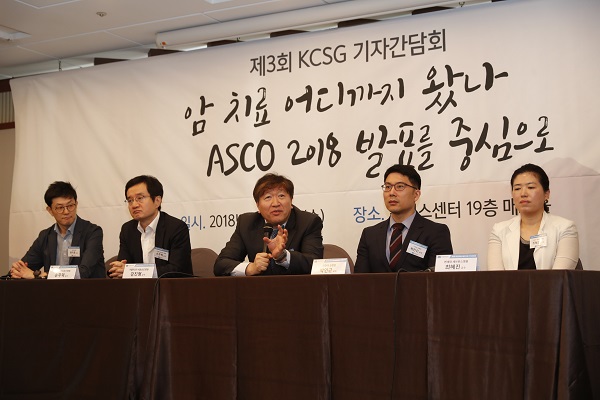Combination treatment has become one of the hottest trends for immunotherapies in treating various types of cancer, according to members of a Korean cancer group.
The Korean Cancer Study Group held a news conference Wednesday, to present clinical results introduced at the American Society of Clinical Oncology (ASCO) in Chicago, U.S., last week.

“ASCO was attended by 39,000 people around the world and was meaningful in sharing clinical results to find better treatments by cancer type,” said Professor Kang Jin-hyoung at Seoul St. Mary’s Hospital, who also heads the group. “The Korean Cancer Study Group will work towards more effective treatments for domestic cancer patients by carrying out clinical trials for cancer in the country.”
In particular, immunotherapies, which first appeared in 2015, attracted particular attention by being increasingly adopted as combination therapies, during the ASCO conference, speakers said. Immunotherapies as a first-line treatment for lung cancer also drew interests, they added.
A total of 244 abstracts out of 5,800 at the ASCO were focused on combination therapies that aimed to increase the responsiveness of immunotherapies.
“Immunotherapies have progressed rapidly to be used in first-line therapies in lung cancer within a couple of years,” said Professor Sohn Joo-hyuk from Yonsei Cancer Center, one of the speakers at the news conference. “We selected the research we thought had significance in changing treatment guidelines.”
In the spotlight were clinical trials on combination therapies of immunotherapies and anticancer drugs such as Keynote-407 and IMpower131. Results from an IMpower 150 trial on a combination of immunotherapy, anticancer therapy, and targeted agents drew attention. A trial on immunotherapy combos such as Checkmate-227 was also introduced at the ASCO.
The trend toward using immunotherapies along with other agents is mainly owing to higher responsiveness and progression-free survival rates in comparison to cytotoxic anticancer agents. Combination therapies were also found to be less toxic than cytotoxic chemotherapy.
“Immunotherapies were found to have better response rates and PFS as a combination therapy than when used as a monotherapy. Besides, combination therapies did not have high toxicity compared to cancer therapies and could be sufficiently controlled, indicating its future use,” said Professor Park In-keun from Gachon University, Gil Medical Center
Immunotherapies have become the typical treatment for lung cancer. Now clinical trials of immunotherapy with other immunotherapies are underway for various types of carcinoma such as bladder and kidney cancer, which will significantly contribute to changing the cancer treatment paradigm, Park added.

